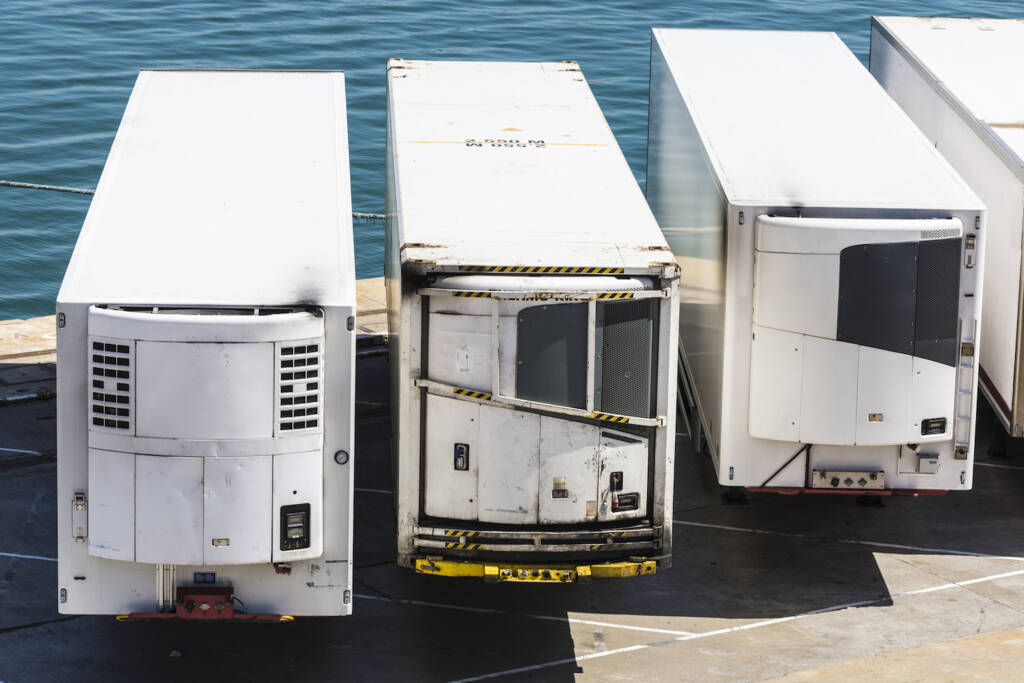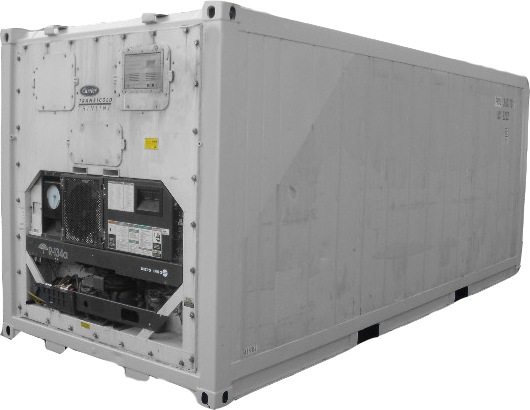
Refrigerated shipping containers are quick and cost-effective solutions for customers requiring climate-controlled storage. Ranging in temperatures from -15 F to 60 F, these containers can be set up on the ground for easy ground-level access or left on a chassis trailer for customers with loading docks. Refrigerated shipping containers are equipped with electronic refrigeration machinery requiring 440V 3-Phase power. These electronics are easily maintained and are more cost-effective than diesel refrigeration trailers. Unlike diesel machinery, On-Site refrigerated shipping containers require no refueling and are much quieter to operate with no harmful exhaust.
Refrigerated Container Sizes

20′ Refrigerated Containers
Exterior Dimensions 20′ L x 8′ W x 8’6 H
Interior Dimensions 17′ L x 7’6 W x 7’6 H
Door Opening 7’2 W x 7’5 H
Tare Weight 6,830 lbs.
Max Gross Weight 67,200 lbs.
Max Payload 60,370 lbs.
40′ High Cube Refrigerated Containers
Exterior Dimensions 40′ L x 8′ W x 9’6″ H
Interior Dimensions 37′ L x 7′ 6″ W x 8’3″ H
Door Opening 7’6″ W x 8’3″ H
Tare Weight 10,270 lbs.
Max Gross Weight 74,960 lbs.
Max Payload 64,690 lbs.
Advantages of a Refrigerated Electric vs. Diesel Container
Advantages
• Lower cost to Purchase or Rent
• Lower cost to operate
• No diesel charges
• No refueling charges
• No hourly usage charges
• Lower maintenance
• Quieter
• Ground Level Access or Dock Level Access
• Superior construction and insulation.
Heavy Duty Construction
• Aluminum Exterior
• Stainless Steel Interior
• R30 insulation
• Aluminum T-rail Floor
• 2 Heavy duty locking cargo doors on one end
Electrical Requirements
• 440-460 Volt. 3 Phase power, 25 Amp Max Draw
Buying a Refrigerated Shipping Container
When buying a refrigerated shipping container know what to look for. It’s important to know the required size and type of power supply.
Refrigerated shipping containers are sometimes called “reefers.” These containers hold cargo sensitive to temperature. The container is designed for deep-frozen, frozen, and chilled cargo. Examples include producing, meat, chemicals, and pharmaceuticals.
Reefers keep items cool by circulating cold air throughout the container. Depending on specific items, the container temperature ranges from -15 F to 60 F.
Dimensions of reefers are the same as regular containers.
Types and Sizes
There are two main types of reefers. These include porthole and integrated containers.
A porthole container is insulated with two holes on the rear wall. The cold air pumps through the holes.
The second type is the integrated container. These have an integrated cooling system. Vents distribute the air from the floor to the top of the container.
These are easier to move and transport between different areas. Reefer containers are made with heavy-duty materials including aluminum and stainless steel and the size of an average refrigerated container is the same as non-refrigerated containers. The most common types are 20 feet and 40 feet in length. The size you choose depends on how much cargo you need to transport.
Benefits
There are several benefits to refrigerated shipping. Reefers don’t emit harmful exhausts like diesel refrigeration trailers. They are environmentally friendly and don’t require refueling. The transportation and installation are easier by its technology. They have unmatched durability against rough weather conditions and treatment.
Reefers are cost-effective. These containers are cheaper to rent and operate than other forms of refrigerated transport.
Buying a Container
Buying a reefer isn’t too difficult. First, consider the use of the container. This determines size and temperature. Every reefer has a description of its dimensions and certifications. The items you’re transporting also advise how many containers you’ll need and how many trips there will be.
A refrigerated shipping container is the ultimate multipurpose transport for items that need to stay cool. It can be used for large events, factory stores, and so much more. Finally, consider the cost. Look for a refrigerated container that meets your requirements and is reasonably priced. You can see the cities and prices we serve out of here on the page for Refrigerated Containers. If you don’t see a nearby city listed, you can contact us for a possible custom order, depending upon inventory.


